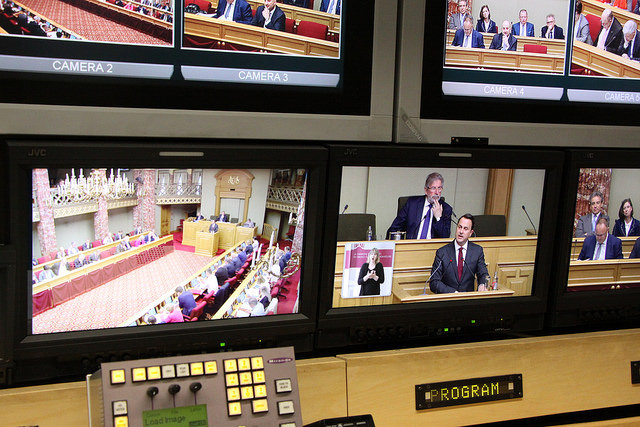The CSV, the main opposition party with 23 MPs (out of 60), was very critical, arguing that the coalition government was not dealing with fundamental issues such as pensions.
The other two opposition parties also assessed the speeches negatively.
Déi Lénk (2 MPs)
For Marc Baum, it was “a disappointing speech full of platitudes”. Even the slogan “Luxembourg does well if the people in Luxembourg do well” was self-evident. The central questions such as housing had not been touched on, he stated.
ADR (3 MPs)
Gast Gibéryen accused the government of “dilly-dallying”, and said that growth brings increasing problems for future generations which the government ignores.
The governing parties
The DP’s parliamentary leader, Eugène Berger, countered that the government had prepared the country well for the future through some concrete policies.
Alex Bodry, the parliamentary leader of the LSAP, said that the goal had not been to “make some spectacular announcements”. The government had found its rhythm but that some reforms needed time to have an impact.
The Greens’ Viviane Loschetter said that this was a sort of review of the past three years, and that the government was at least trying to work up all the areas that had been neglected over the past decades.
The media
Some media outlets have criticised the government’s declarations, others have been jaded by the whole process of a state of the nation speech and a multiannual stability and growth programme in a digital world.
Wort: The editorial by Diane Lecorsais focuses on the 1.1 million inhabitants debate and how that projection is not being dealt with in the land development plan. She advocates a complete overhaul of urban planning around Luxembourg.
Tageblatt: The commentary by Léon Marx focuses on the conservative budgetary estimates on the previous governments, which now favour the current government. It ends by wondering whether Claude Wiseler (CSV) is starting to veer more to the right than the ADR through his constant criticisms of the government’s policies.
Journal: Claude Karger thinks it’s the same procedure as every year, and that it cannot be called a debate anymore. Nevertheless, he gives Bettel good marks on the speech and on the economic figures. He criticises the opposition for not coming up with their own policy proposals.
Paperjam (published by the same company as Delano): François Aulner is also jaded by the predictability of the parliamentary game between government and opposition on the state of the nation speech. He argues that the first government without the CSV since the 1970s has not managed to change the central tenets of increased growth and redistribution, and have not questioned fundamentally whether it is sustainable.
Radio 100,7: the commentary by Jean-Claude Franck notes that the coalition parties have improved their own branding and marketing skills, but that content wise they have not managed to evolve. Before the 2018 parliamentary elections, Franck does not expect any new major policies, as the parties have stood still on their 2013 coalition programme.
RTL Télé Lëtzebuerg: Caroline Mart analyses the speech in the context of the upcoming local elections (8 October 2017) and the parliamentary elections in 2018. She argues that the time for saving has passed, and redistribution is on the cards, with the government allowing a deficit of -0.5%. Luxembourg is used to being better off than its neighbours, and growth levels and triple As are not that much of a concern: the voters will decide based on their personal situation. With long traffic jams and housing problems, many voters feel they pay the price of high growth with a lower quality of life.
CORRECTION: A previous version of this article misstated the number of Déi Lénk MPs.
